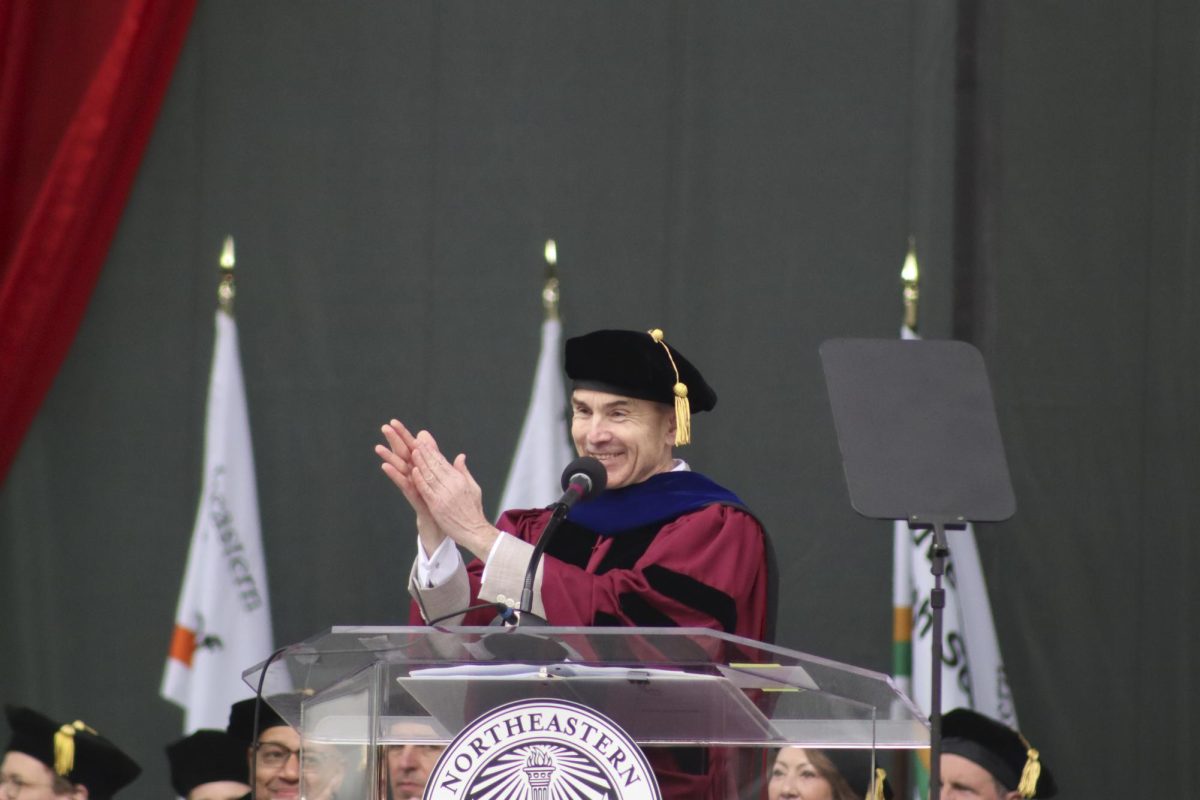The News published the original version of this article on March 25 with several misquotations due to audio transcription errors. This version contains the corrected quotations. The News regrets the errors.
President Joseph Aoun commented on the football program’s termination, the College of Arts and Sciences restructure and the four-year option, as well as the direction of the university, in a sit-down with members of The News’ editorial board Monday.
When asked why he decided to terminate the football program, he said the decision was a difficult one, but the football team was not economically feasible for the university to keep.
“We saw that a kind of new infrastructure that would have cost a lot of money, over $50 million, including increasing the support on a yearly basis, on a continuing basis for the program per se,” he said.
He added that because it was not economically feasible, the university could not give those in the program the proper “student experience.”
“The question is to go back to the fundamental and ask why are we involved in athletics at all, the primary reason is the student experience” he said. “And in this domain what frankly has been happening in terms of supporting football has been getting to be so non-commensurate with what a university like ours should do.”
Along with the football program’s termination, the introduction of the four-year option drew resistance from students, most notably in the Facebook group Fight For Five.
He said that decision to create the four-year option had two aspects. One was an effort to curtail a growing trend of students graduating in four years without co-op. The second was that Aoun did not want the university to be “one size fits all.”
“The second aspect we saw was that some of the students were saying that some of the things were given to them as out fiat, namely, that’s how you have to do it. Whereas, I mentioned in various writings that we are moving, that we want to be a student-centered environment, not one size fits all.”
To those who were upset with the College of Arts and Sciences restructure, Aoun said, “Now I can tell you, the change, some people by definition welcome the change and see opportunities in it, some people are going to resist it. But change is not an end by itself, what we are here to do is to serve our mission.”
When asked whether faculty feel comfortable speaking out against his administration, he said, “Absolutely. They have tenure.”
At several times throughout the hour-long meeting, Aoun emphasized the undergraduate mission. He said that as the institution’s leader, it was his responsibility to “serve our mission, you measure our success based on our mission. And our mission is very clear and very simple.”
He then repeated the mission, reading it out of the university’s academic plan. The mission reads, “It’s to educate students for a life of fulfillment and accomplishment and then to create and translate knowledge to meet global and societal needs.”
Aoun said the president’s and administration’s success should be measured by the mission.
“The question is: Are we furthering our mission? If yes, that’s success. If not, that’s retrenchment. That’s how I look at it.”
He also stressed the university’s “momentum” and how it was his job to maintain and strengthen it, especially during a “period of retrenchment.”
“I think that what has been very precious and very important to us, is to maintain and even accelerate our momentum,” he said. “You know what is happening in higher education, there is an enormous retrenchment, many wealthy universities are retrenching, laying off people, cutting, you know, the size of the staff etcetera; reducing the size of the programs. We actually manage to buck the trend.”
He said that the university has “bucked the trend” specifically in faculty hiring. Last year, the university hired 46 new faculty members. This year, the university is attempting to hire 53, at a time when Aoun said other colleges are scaling back funds.
Another central aspect to Aoun’s message was the importance of co-op.
“We wanted [co-op] to be maintained, to be highlighted, to be accelerated,” he said. “I believe that in a period of economic retrenchment, that’s the time where you can take co-op and show the relevance of co-op world-wide, and that’s what we did.”
As for the future, Aoun said his job will entail keeping the university’s momentum and growth, a momentum he said colleagues in the higher education world envy. But, he added, he will also explore new media as a way to reach out to the Northeastern community. He even hinted at a presidential Twitter account.









